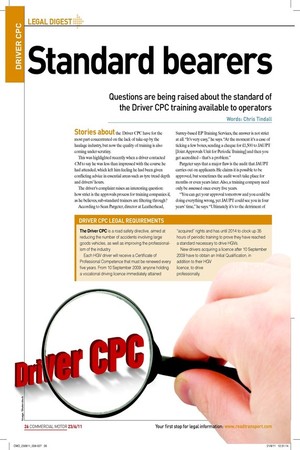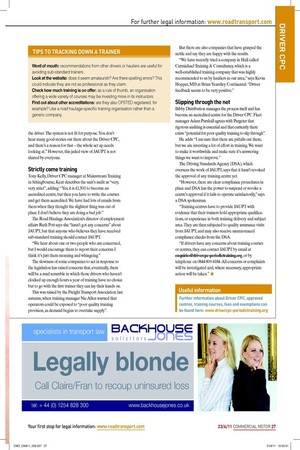Standard bearers
Page 21

Page 22

If you've noticed an error in this article please click here to report it so we can fix it.
Questions are being raised about the standard of the Driver CPC training available to operators
Words: Chris Tindall
Stories about the Driver CPC have for the most part concentrated on the lack of take-up by the haulage industry, but now the quality of training is also coming under scrutiny.
This was highlighted recently when a driver contacted CM to say he was less than impressed with the course he had attended, which left him feeling he had been given conlicting advice in essential areas such as tyre tread depth and drivers’ hours.
The driver’s complaint raises an interesting question: how strict is the approvals process for training companies if, as he believes, sub-standard trainers are iltering through?
According to Sean Pargeter, director at Leatherhead, Surrey-based EP Training Services, the answer is not strict at all. “It’s very easy,” he says. “At the moment it’s a case of ticking a few boxes, sending a cheque for £1,500 to JAUPT [Joint Approvals Unit for Periodic Training] and then you get accredited – that’s a problem.” Pargeter says that a major law is the audit that JAUPT carries out on applicants. He claims it is possible to be approved, but sometimes the audit won’t take place for months or even years later. Also, a training company need only be assessed once every ive years.
“You can get your approval tomorrow and you could be doing everything wrong, yet JAUPT could see you in four years’ time,” he says. “Ultimately it’s to the detriment of the driver. The system is not it for purpose. You don’t hear many good stories out there about the Driver CPC, and there’s a reason for that – the whole set up needs looking at.” However, this jaded view of JAUPT is not shared by everyone.
Strictly come training
Tony Kelly, Driver CPC manager at Mainstream Training in Sittingbourne, Kent describes the unit’s audit as “very, very strict” , adding: “Yes, it is £1,500 to become an accredited centre, but then you have to write the courses and get them accredited. We have had lots of emails from them when they thought the slightest thing was out of place. I don’t believe they are doing a bad job.” The Road Haulage Association’s director of employment affairs Ruth Pott says she “hasn’t got any concerns” about JAUPT, but that anyone who believes they have received sub-standard training should contact JAUPT.
“We hear about one or two people who are concerned, but I would encourage them to report their concerns. I think it’s just them moaning and whingeing.” The slowness of some companies to act in response to the legislation has raised concerns that, eventually, there will be a mad scramble in which those drivers who haven’t clocked up enough hours a year of training have no choice but to go with the irst trainer they can lay their hands on.
This was raised by the Freight Transport Association last autumn, when training manager Nic Allen warned that
��� Legally ���������������� advert 16/2/1
operators could be exposed to “poor quality training provision, as demand begins to overtake supply” . But there are also companies that have grasped the nettle and say they are happy with the results.
“We have recently tried a company in Hull called Carmichael Training & Consultancy, which is a well-established training company that was highly recommended to us by hauliers in our area,” says Kevin Hopper, MD at Brian Yeardley Continental. “Driver feedback seems to be very positive.”
Slipping through the net
Bibby Distribution manages the process itself and has become an accredited centre for the Driver CPC. Fleet manager Adam Purshall agrees with Pargeter that rigorous auditing is essential and that currently there exists “potential for poor quality training to slip through” .
He adds: “I am sure that there are pitfalls out there, but we are investing a lot of effort in training. We want to make it worthwhile and make sure it’s answering things we want to improve.” The Driving Standards Agency (DSA), which oversees the work of JAUPT, says that it hasn’t revoked the approval of any training centre yet.
“However, there are clear compliance procedures in place and DSA has the power to suspend or revoke a centre’s approval if it fails to operate satisfactorily,” says a DSA spokesman.
“Training centres have to provide JAUPT with evidence that their trainers hold appropriate qualiications, or experience in both training delivery and subject area. They are then subjected to quality assurance visits from JAUPT, and may also receive unannounced compliance checks from the DSA.
“If drivers have any concerns about training courses or centres, they can contact JAUPT by email at enquiries@drivercpc-periodictraining.org, or by telephone on 0844 800 4184. All concerns or complaints will be investigated and, where necessary, appropriate action will be taken.” ■













































